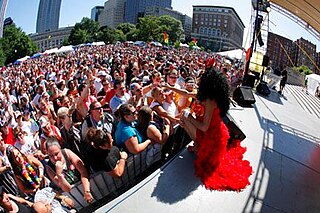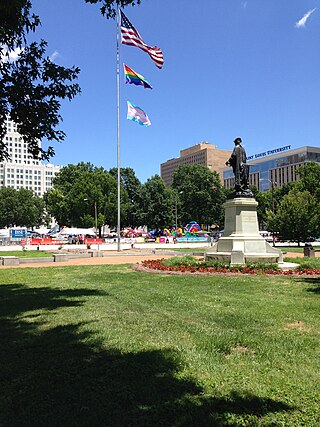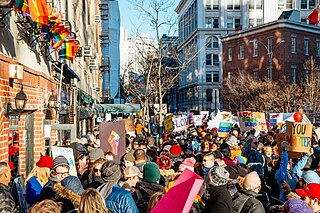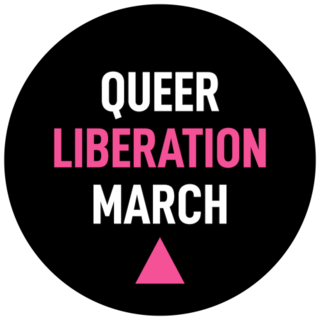
A pride parade is an event celebrating lesbian, gay, bisexual, transgender and queer (LGBTQ) social and self-acceptance, achievements, legal rights, and pride. The events sometimes also serve as demonstrations for legal rights such as same-sex marriage. Most occur annually throughout the Western world, while some take place every June to commemorate the 1969 Stonewall riots in New York City, which was a pivotal moment in modern LGBTQ social movements. The parades seek to create community and honor the history of the movement. In 1970, pride and protest marches were held in Chicago, New York City, Los Angeles, and San Francisco around the first anniversary of Stonewall. The events became annual and grew internationally. In 2019, New York and the world celebrated the largest international Pride celebration in history: Stonewall 50 - WorldPride NYC 2019, commemorating the 50th anniversary of the Stonewall Riots, with five million attending in Manhattan alone. Pride parades occur in urban locations worldwide, incl. cities or urban areas in Argentina, Australia, Brazil, Canada, Chile, Denmark, Finland, France, Israel, Japan, Mexico and the United States.

The NYC Pride March is an annual event celebrating the LGBTQ community in New York City. The largest pride parade and the largest pride event in the world, the NYC Pride March attracts tens of thousands of participants and millions of sidewalk spectators each June, and carries spiritual and historical significance for the worldwide LGBTQIA+ community and its advocates. Entertainer Madonna stated in 2024, "Aside from my birthday, New York Pride is the most important day of the year." The route through Lower Manhattan traverses south on Fifth Avenue, through Greenwich Village, passing the Stonewall National Monument, site of the June 1969 riots that launched the modern movement for LGBTQ+ rights.

Based in San Francisco, California, the Harvey Milk LGBTQ Democratic Club is a chapter of the Stonewall Democrats, named after LGBT politician and activist Harvey Milk. Believing that the existing Alice B. Toklas LGBT Democratic Club would never support him in his political aspirations, Milk co-founded the political club under the name "San Francisco Gay Democratic Club" in the wake of his unsuccessful 1976 campaign for the California State Assembly. Joining Milk in forming the club were a number of the city's activists, including Harry Britt, Dick Pabich, Jim Rivaldo, and first club president Chris Perry.

Indy Pride Festival is the annual week of LGBT pride events in Indianapolis. The week is organized by LGBTQ organization Indy Pride, Inc., and has been held under this name and organization for over a decade. In recent years, more than 95,000 gay, lesbian, bisexual, transgender and heterosexual people have attended the festival. Indy Pride's Parade and Festival is held the 2nd Saturday in June, with a week of events leading up to it, in honor of the Stonewall Riots and in accordance with other United States pride festivals. Indy Pride Festival is the largest LGBT pride event in Indiana.

Pride is the promotion of the self-affirmation, dignity, equality, and increased visibility of lesbian, gay, bisexual, transgender and queer (LGBTQ) people as a social group. Pride, as opposed to shame and social stigma, is the predominant outlook that bolsters most LGBTQ rights movements. Pride has lent its name to LGBTQ-themed organizations, institutes, foundations, book titles, periodicals, a cable TV channel, and the Pride Library.

Atlanta Pride, also colloquially called the Atlanta Gay Pride Festival, is a week-long annual lesbian, gay, bisexual, transgender (LGBTQ) pride festival held in Atlanta, Georgia. Established in 1971, it is one of the oldest and largest pride festivals in the United States. According to the Atlanta Pride Committee, as of 2017, attendance had continually grown to around 300,000. Originally held in June, Atlanta Pride has been held in October every year since 2008, typically on a weekend closest to National Coming Out Day.

PrideFest St. Louis is an annual LGBT pride event in St. Louis, Missouri. The event is organized by Pride St. Louis, an LGBT non-profit organization in the Greater St. Louis area. Between 350,000-500,000 people attend the two day festival and grand parade.

LGBTQ history in Turkey covers the development, contributions and struggles of lesbian, gay, bisexual, transgender, and queer (LGBTQ) people in the history of Turkey and their relation between Turkish politics from the abolition of the Caliphate to modern-day Turkey.

The Cincinnati Pride Parade and Festival is a week-long celebration of the city's Lesbian, Gay, Bisexual, Transgender, Queer, and other identities ([LGBTQ+]) community. The festivities are typically held annually at the end of June but have happened as early as April and as late as July in various locations of Cincinnati, Ohio.

The development of LGBT culture in Philadelphia can be traced back to the early 20th century. It exists in current times as a dynamic, diverse, and philanthropically active culture with establishments and events held to promote LGBT culture and rights in Philadelphia and beyond.

Columbus Pride is an LGBTQ festival in Columbus, Ohio, hosted by Stonewall Columbus. The event first took place in 1981, and has grown into the second largest LGBT pride event in the Midwest, behind Chicago. The pride parades typically include marching bands, firetrucks, motorcycles, and floats covered in rainbow flags or balloons.

New York City has been described as the gay capital of the world and the central node of the LGBTQ+ sociopolitical ecosystem, and is home to one of the world's largest and most prominent LGBTQ+ populations. Brian Silverman, the author of Frommer's New York City from $90 a Day, wrote the city has "one of the world's largest, loudest, and most powerful LGBT communities", and "Gay and lesbian culture is as much a part of New York's basic identity as yellow cabs, high-rise buildings, and Broadway theatre". LGBT travel guide Queer in the World states, "The fabulosity of Gay New York is unrivaled on Earth, and queer culture seeps into every corner of its five boroughs". LGBTQ advocate and entertainer Madonna stated metaphorically, "Anyways, not only is New York City the best place in the world because of the queer people here. Let me tell you something, if you can make it here, then you must be queer."

Twin Cities Pride, sometimes Twin Cities LGBT Pride, is an American nonprofit organization in Minnesota that hosts an annual celebration each June that focuses on the LGBT community. The celebration features a pride parade which draws crowds of nearly 600,000 people. The parade was designated the Ashley Rukes GLBT Pride Parade in honor of the late former parade organizer and transgender LGBT rights activist. Other Twin Cities Pride events include a festival in Loring Park and a block party spanning multiple days.
Austin, Texas, has one of the most prominent and active LGBT populations in the United States. Austin was acclaimed by The Advocate in 2012 as part of its Gayest Cities in America, and was recognized by Travel and Leisure as one of America's Best Cities for Gay Travel. Much of Austin's gay nightlife scene is clustered around 4th Street. LGBT activism groups Atticus Circle and Equality Texas are headquartered in Austin.

There were several protests organized by the LGBTQ community against the policies of United States President Donald Trump and his administration.

The Queer Liberation March is an annual LGBT protest march in Manhattan, organized by the Reclaim Pride Coalition as an anti-corporate alternative to the NYC Pride March.

In Washington, D.C., LGBT culture is heavily influenced by the U.S. federal government and the many nonprofit organizations headquartered in the city.

Pride Month, sometimes specified as LGBTQ Pride Month, is a monthlong observance dedicated to the celebration of LGBTQ pride, commemorating the contributions of lesbian, gay, bisexual, transgender and queer(LGBTQ) culture and community. Pride Month is observed in June in the United States, coinciding with the anniversary of the 1969 Stonewall riots, a series of gay liberation protests.
















